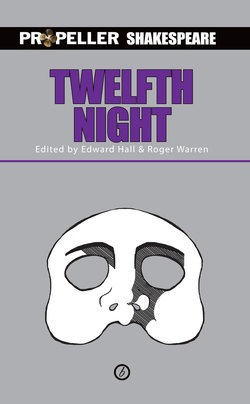Читать книгу Twelfth Night - William Shakespeare - Страница 11
На сайте Литреса книга снята с продажи.
Kinds Of Love: Twelfth Night
ОглавлениеTwelfth Night is an ambiguously erotic play. It dramatizes many different kinds of love, ranging from Orsino’s and Olivia’s love for Viola/Cesario, Antonio’s for Sebastian, and the love felt by the twins for one another, to Malvolio’s deluded love for Olivia, and, on a more basic level, the relationship, and eventual marriage, of Sir Toby and Maria. Orsino is wooing Olivia from afar, but has no real relationship with her; much nearer to home is his obvious, and immediate, attraction to his apparent servant, Viola/ Cesario. Viola comes into the claustrophobic world of Orsino and Olivia, and turns it upside down. She awakens, brings to the surface, the potential for emotional fulfilment in Orsino and Olivia, especially in the great central scene where she obliquely declares her love for Orsino in the allegory of a sister who died of love:
She never told her love,
But let concealment, like a worm i’th’ bud,
Feed on her damask cheek; she pined in thought,
And with a green and yellow melancholy
She sat like patience on a monument,
Smiling at grief.
‘Smiling at grief’: the phrase trenchantly summarises the bitter-sweet tone of the play, its beautifully sustained balance between laughter and tears.
Shakespeare probably wrote Twelfth Night in 1601, at roughly the same time as Hamlet, when he was at the height of his powers, so its theatrical mastery is not surprising. But his personal experiences may have contributed to that achievement. The sexually ambiguous figure of Viola/Cesario seems very closely related to the male lover of the Sonnets, whom Shakespeare calls ‘the master-mistress of my passion’. Again, when in her speech quoted above, Viola goes on to say that she is ‘all the brothers’ of her father’s house, she increases its ambiguous potential: she is expressing her love for Orsino, but also for the twin brother she thinks is dead. The twins introduce a vein of particularly intense emotion into Twelfth Night. Shakespeare was the father of twins, Judith and Hamnet. Judith lost her brother at the age of eleven, in 1596, and Shakespeare may have known what modern research into bereaved twins has demonstrated: that the death of a twin seems to cause a particularly intense sense of desolation, so that the surviving twin often tries to ‘compensate’ for the loss by attempting to assume the other’s identity, as Viola does in assuming her brother’s persona for her male disguise.
The Malvolio subplot presents a love story of a different kind — though perhaps with another connection between the play and its author. In Sonnet 62, Shakespeare accuses himself of the ‘sin of self-love’, the very fault Olivia criticises in Malvolio. This plot moves from the broad comedy of the letter and yellow stockings scenes to something much harsher: the attempt to drive Malvolio mad, shutting him up in a ‘dark room’ or prison. In this scene, Malvolio is tormented by his adversary Feste, who subsequently tells him that ‘the whirligig of time brings in his revenges’. But Feste is not merely a revenger; he seems to encapsulate the whole tone of the play: when, for instance, he compares Orsino’s mind to an opal — a gem that changes in the light — he catches its shifting, sweet-sour mood. He holds up mirrors to the other characters, penetrating Viola’s disguise, criticising Orsino’s love-melancholy, or exposing the excess of Olivia’s mourning for her brother. His final song emphasises that the rain raineth every day — but at the same time he tells the audience he wants to please them. So this ambiguous play ends ambiguously: after all, its subtitle in the 1623 Folio is ‘What You Will’.
Roger Warren
